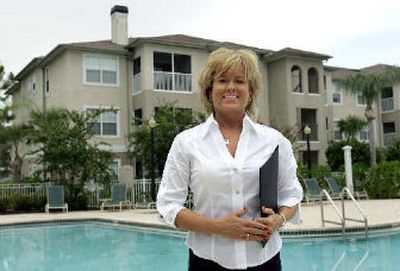From conversion to reversion

NEW YORK — Even when it was clear in December that Florida’s condo market was slowing, Ted Charron went ahead and bought a two-bedroom, two-bathroom condo in Tampa, where some industry experts say the froth is especially frothy.
He did not buy the condo to turn it for a quick profit, however, but to the tap growing demand for rentals, a by-product of the condo conversions that have swept through metropolitan areas nationwide.
“It wasn’t a flip, more of a long-term investment,” said Charron, an information technology director who works in nearby St. Petersburg. “Because there are so many of these conversions, there’s just not a lot of places to rent, so I think the demand for rentals is actually going to go up.”
Growing demand for rentals stems from many factors. Buyers are finding the market less affordable, leading to fewer sales and a greater pool of renters. And conversion of condos took rental inventory off the market.
But condo conversions are slowing in some of the nation’s once-hot housing markets, and in some instances, condos are reverting back to rentals. Markets that have seen reversions include several in Florida, as well as Las Vegas, San Diego and Phoenix, according to Hessam Nadji, managing director of research services at Marcus & Millichap, a national real estate investment brokerage company. Between 25 percent to 40 percent of the condos being developed or converted in those markets are likely to be offered as rentals instead, he said.
Condos have not succumbed to the reversion trend and solid sales are expected in Seattle, Philadelphia, Tucson and Portland, Nadji said.
Condo conversions nationwide peaked in September 2005 and by June of this year levels had fallen back to those last seen in early 2004, before the bulk of the conversions happened. Nearly 28,000 units costing more than $4 billion were converted in September, while only 3,354 units were converted in June at a total cost of $449.4 million, according to a report from Real Capital Analytics, a research and consulting firm.
Nadji sees further softening in the second half of 2006 and in 2007.
Greater demand for rentals should soak up some of the excess condo capacity in selected cities. Evidence exists that it is already doing so.
The number of condos being turned into rentals is actually greater than what can be tracked, said real estate consultant Michael Slater, of Triad Research & Consulting in Tampa. There is a shadow market in rentals, where condo buyers become landlords and apartment managers, and that can also act as a Band-Aid for the slowing condo market, he said.
Diane Lee, president of DLG Management Services in Tampa, said about 40 percent to 60 percent of condos that were planned for conversion there are reverting to rentals, and that many of the condos were bought by investors, so they are essentially rentals anyway.
“Now what’s happened in the last five to six months, a lot of converters have bought an apartment building, started sales, and it’s died off, so they’re choosing to stop sales,” she said.
The trend that is prevalent in southeast Florida appears to be spreading to markets in Washington, D.C., and San Diego, said Michael Cohen, research strategist at Property & Portfolio Research.
“Florida was on the leading edge of the trend so it would make sense that they would peak first,” said Chris Bates of RealFacts, a Novato, Calif.-based research firm.
In Tampa, Charron successfully rented his newly bought condo after figuring out what price the market would support. He initially asked for $1,200 a month in rent but lowered the price twice before finding a large enough pool of candidates to suit him.